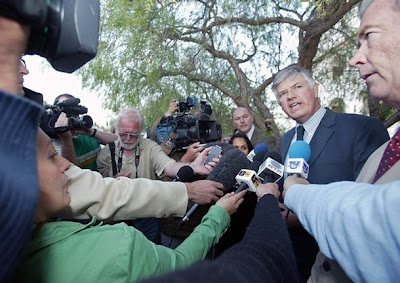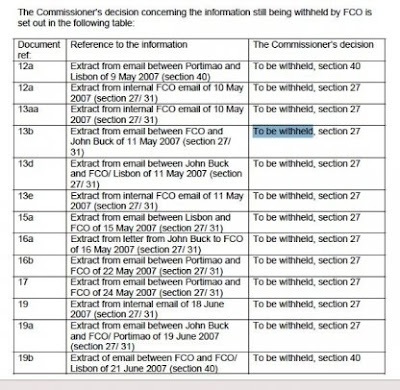A few minutes after the return to Faro of the team of experts that the PJ had sent to Leicester, Her Majesty's British Ambassador, John Buck, to the Portuguese Republic was already visiting their premises. The presence of the diplomat, that has been confirmed by several journalist, is in direct relation with the Madeleine McCann case and was not asked by the Portuguese Authorities. The ambassador has stayed half an hour with the police.
John Buck - British Ambassador in Portugal in May 2006 - resigns his post on 10/09/07 - shortly after the McCanns are made suspects. John is replaced by Alexander Ellis. Leaves the Diplomatic Services entirely.
Related
Daily Express: Madeleine: British Diplomat had doubts about McCanns
3 December 2007 (no longer on-line)
A British diplomat warned the Foreign Office of concerns regarding Madeleine McCann’s parents, it emerged last night. Doubts about Kate and Gerry McCann were raised almost immediately by an official sent to Praia da Luz due to what he considered to be “inconsistencies” in the couple’s testimonies about the night the four-year-old vanished. The warning was contained in a classified document sent from the Algarve to the Foreign Office days after Madeleine’s disappearance. Details of the letter have been leaked through the British diplomatic mission in Brussels to the respected Belgian newspaper Derniere Heure.
The unnamed diplomat voices his concern about the “confused declarations” as to the whereabouts of Kate and Gerry McCann and their friends in the final hours before Madeleine’s disappearance. He also mentions the couple’s “lack of co-operation” with the Portuguese police in the light of instructions from London suggesting consular staff “overstretch their authority and put pressure on the Portuguese authorities”. The document also asks for confirmation of orders sent by the Foreign Office in London the day before, commanding embassy staff to give “all possible assistance to the McCann couple”.
Diplomats on the Algarve were told the McCanns had to be “accompanied at all times during any contact with the Portuguese police” by a member of consular staff or by British police officers sent out from the UK. The letter, sent just days after Madeleine disappeared, warns of the risks of siding with the McCanns so completely. Excerpts published in a report by La Derniere Heure quote the diplomat as saying: “With the greatest respect, I would like to make you aware of the risks and implications to our relationship with the Portuguese authorities, if you consider the possible involvement of the couple. “Please confirm to me, in the light of these concerns, that we want to continue to be closely involved in the case as was requested in your previous message.”
A huge team of diplomats have been involved in the case since Gerry McCann asked the Foreign Office for help. In an unprecedented move, the then Prime Minister Tony Blair despatched special envoy Sheree Dodd, a former Fleet Street journalist, to Portugal to act as a “media liaison officer” for the McCann family. Direct government communications with the McCanns came to an abrupt halt, however, when the couple were made official suspects in the case in September.
Portuguese detectives believe it is possible Madeleine died as the result of an accident on May 3 in the family’s holiday apartment and that her parents hid and later disposed of her body with the help of their friends. The couple have always said they had nothing to do with their daughter’s disappearance. The Belgian report says it is highly significant that almost all of the diplomats involved at the outset have now been taken off the case.
Special envoy Sheree Dodd has since resigned from the Foreign Office, the British consul in the Algarve Bill Henderson has retired and the British ambassador to Portugal John Buck is no longer in Portugal. Last night the Foreign Office refused to comment on the report.
Extracts from the FOI released by ICO - Information Commissioner's Office
Freedom of Information Act 2000 (Section 50) Decision Notice 3 March 2009 Public Authority: Foreign and Commonwealth Office - Reference: FS50188322
In October 2007 the complainant asked the Foreign and Commonwealth Office (FCO) for information concerning communications between the then Ambassador to Portugal John Buck and the Portuguese police on the subject of the disappearance of the child Madeleine McCann. However, some further information continued to be withheld; it was this refusal to provide information that the Commissioner investigated.
FCO added that, at the time of the internal review (December 2007), the investigation into the disappearance of Madeleine McCann had been ongoing and that, for legal reasons, it had not been possible to disclose further information then.
FCO told the Commissioner that, although the Portuguese authorities had released many documents about the investigation into the disappearance of Madeleine McCann, sensitivities remained and FCO believed that the section 27(1)(a)* exemption still applied. If FCO were to disclose all the details about HM Ambassador’s contact with the Portuguese police they would risk damaging the relationship on which good inter-governmental co-operation was based.
FCO recognised the public interest in knowing the extent of UK government involvement in the investigation but believed that the reasons for exemption outweighed those that favoured release.
The Full Freedom of Information Act on John Buck, The British Ambassador in 2007 at the time of Madeleine McCann disappearance.
Freedom of Information Act on John Buck, The British Ambassador in 2007 at the time of Madeleine McCann dis... by xklamation
<iframe class="scribd_iframe_embed" data-aspect-ratio="0.7068965517241379" data-auto-height="false" frameborder="0" height="786" id="doc_50562" scrolling="no" src="https://www.scribd.com/embeds/309939715/content?start_page=1&view_mode=scroll&access_key=key-ytXAoIjFxy2ipHYImDKa&show_recommendations=true" width="590" style="outline: 0px; transition: all 0.3s ease; max-width: 100%;"></iframe>*The exemption under section 27 exists to protect the United Kingdom's international relations, its interests abroad and the United Kingdom's ability to protect and promote those interests. [full PDF here]
Section 27 consists of two different kinds of exemption:
Section 27(1) focuses on the effects of disclosure rather than on the type of information. Information is exempt if its disclosure would or would be likely to prejudice any of the matters mentioned in section 27(1)(a) - (d):
a) relations between the UK and any other state
b) relations between the UK and any international organisation or international court
c) the interests of the UK abroad
d)the promotions or protection by the UK of its interests abroad
Section 27(2) protects confidential information obtained from a foreign state, an international organisation, or an international court. Section 27(2) describes information by reference to its origins and the circumstances in which it was obtained.

















